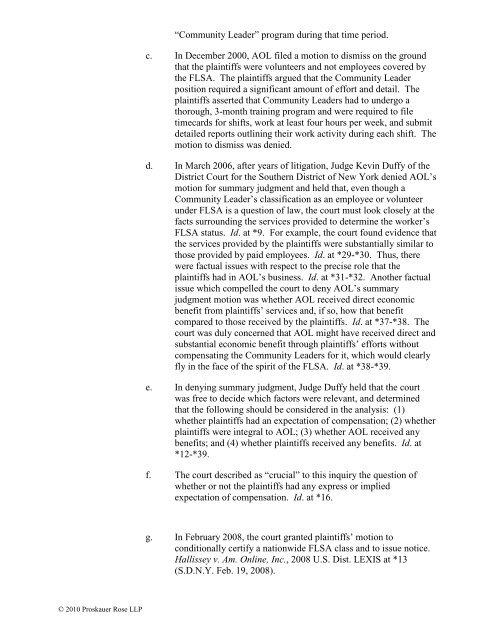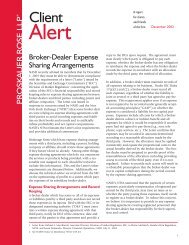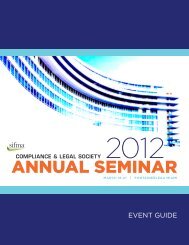Misclassification of Workers - Proskauer Rose LLP
Misclassification of Workers - Proskauer Rose LLP
Misclassification of Workers - Proskauer Rose LLP
Create successful ePaper yourself
Turn your PDF publications into a flip-book with our unique Google optimized e-Paper software.
© 2010 <strong>Proskauer</strong> <strong>Rose</strong> <strong>LLP</strong><br />
“Community Leader” program during that time period.<br />
c. In December 2000, AOL filed a motion to dismiss on the ground<br />
that the plaintiffs were volunteers and not employees covered by<br />
the FLSA. The plaintiffs argued that the Community Leader<br />
position required a significant amount <strong>of</strong> effort and detail. The<br />
plaintiffs asserted that Community Leaders had to undergo a<br />
thorough, 3-month training program and were required to file<br />
timecards for shifts, work at least four hours per week, and submit<br />
detailed reports outlining their work activity during each shift. The<br />
motion to dismiss was denied.<br />
d. In March 2006, after years <strong>of</strong> litigation, Judge Kevin Duffy <strong>of</strong> the<br />
District Court for the Southern District <strong>of</strong> New York denied AOL’s<br />
motion for summary judgment and held that, even though a<br />
Community Leader’s classification as an employee or volunteer<br />
under FLSA is a question <strong>of</strong> law, the court must look closely at the<br />
facts surrounding the services provided to determine the worker’s<br />
FLSA status. Id. at *9. For example, the court found evidence that<br />
the services provided by the plaintiffs were substantially similar to<br />
those provided by paid employees. Id. at *29-*30. Thus, there<br />
were factual issues with respect to the precise role that the<br />
plaintiffs had in AOL’s business. Id. at *31-*32. Another factual<br />
issue which compelled the court to deny AOL’s summary<br />
judgment motion was whether AOL received direct economic<br />
benefit from plaintiffs’ services and, if so, how that benefit<br />
compared to those received by the plaintiffs. Id. at *37-*38. The<br />
court was duly concerned that AOL might have received direct and<br />
substantial economic benefit through plaintiffs’ efforts without<br />
compensating the Community Leaders for it, which would clearly<br />
fly in the face <strong>of</strong> the spirit <strong>of</strong> the FLSA. Id. at *38-*39.<br />
e. In denying summary judgment, Judge Duffy held that the court<br />
was free to decide which factors were relevant, and determined<br />
that the following should be considered in the analysis: (1)<br />
whether plaintiffs had an expectation <strong>of</strong> compensation; (2) whether<br />
plaintiffs were integral to AOL; (3) whether AOL received any<br />
benefits; and (4) whether plaintiffs received any benefits. Id. at<br />
*12-*39.<br />
f. The court described as “crucial” to this inquiry the question <strong>of</strong><br />
whether or not the plaintiffs had any express or implied<br />
expectation <strong>of</strong> compensation. Id. at *16.<br />
g. In February 2008, the court granted plaintiffs’ motion to<br />
conditionally certify a nationwide FLSA class and to issue notice.<br />
Hallissey v. Am. Online, Inc., 2008 U.S. Dist. LEXIS at *13<br />
(S.D.N.Y. Feb. 19, 2008).




